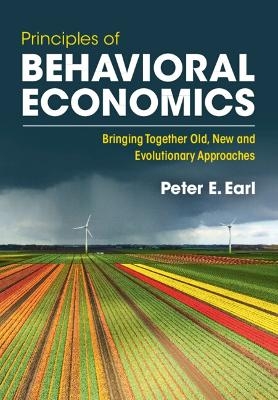
Principles of Behavioral Economics
Bringing Together Old, New and Evolutionary Approaches
Seiten
2022
Cambridge University Press (Verlag)
978-1-009-09589-1 (ISBN)
Cambridge University Press (Verlag)
978-1-009-09589-1 (ISBN)
Presents a grand synthesis of ideas related to behavioral economics. Shows how economics looks if based on real-world assumptions, ideas from psychology and evolutionary selection principles. Draws on ideas covering consumers, firms, macroeconomics and environmental sustainability in an engaging style suited to advanced undergraduate courses.
This book is unique among modern contributions to behavioral economics in presenting a grand synthesis between the kind of behavioral economics popularized by Richard Thaler, earlier approaches such as those of the 1978 Nobel Laureate Herbert Simon, evolutionary psychology, and evolutionary economics from Veblen and Marshall through to neo-Schumpeterian thinking. The synthesis employs a complex adaptive systems approach to how people think, the lifestyles they build, and how new production technologies and products are gradually adopted and produce changes. Using a huge range of examples, it takes behavioral economics from its recent focus on 'nudging' consumers, to the behavior of firms and other organizations, the challenges of achieving structural change and transitioning to environmentally sustainable lifestyles, and instability of the financial system. This book will be of great interest to academics and graduate students who seek a broader view of what behavioral economics is and what it might become.
This book is unique among modern contributions to behavioral economics in presenting a grand synthesis between the kind of behavioral economics popularized by Richard Thaler, earlier approaches such as those of the 1978 Nobel Laureate Herbert Simon, evolutionary psychology, and evolutionary economics from Veblen and Marshall through to neo-Schumpeterian thinking. The synthesis employs a complex adaptive systems approach to how people think, the lifestyles they build, and how new production technologies and products are gradually adopted and produce changes. Using a huge range of examples, it takes behavioral economics from its recent focus on 'nudging' consumers, to the behavior of firms and other organizations, the challenges of achieving structural change and transitioning to environmentally sustainable lifestyles, and instability of the financial system. This book will be of great interest to academics and graduate students who seek a broader view of what behavioral economics is and what it might become.
Peter Earl is Honorary Associate Professor of Economics at the University of Queensland, Australia.
1. What is behavioral economics?; 2. What motivates us?; 3. Why is life so full of problems for us to try to solve?; 4. How do we acknowledge problems and assess our options?; 5. How do we deal with uncertainty and ambiguity?; 6. How do we search for solutions to problems?; 7. Why do some things matter more than others?; 8. How do we choose?; 9. How can firms and governments influence our choices?; 10. What determines the productivity of an organization?; 11. How does the competitive process work?; 12. Are there any behavioral insights for macroeconomists?; 13. Can we be happy without destroying the environment?
| Erscheinungsdatum | 19.07.2022 |
|---|---|
| Zusatzinfo | Worked examples or Exercises |
| Verlagsort | Cambridge |
| Sprache | englisch |
| Maße | 168 x 243 mm |
| Gewicht | 920 g |
| Themenwelt | Wirtschaft ► Volkswirtschaftslehre ► Mikroökonomie |
| ISBN-10 | 1-009-09589-7 / 1009095897 |
| ISBN-13 | 978-1-009-09589-1 / 9781009095891 |
| Zustand | Neuware |
| Haben Sie eine Frage zum Produkt? |
Mehr entdecken
aus dem Bereich
aus dem Bereich
Wirtschaftszusammenhänge verstehen und mitreden können
Buch | Softcover (2023)
Wiley-VCH (Verlag)
CHF 27,95
die psychologischen Determinanten menschlicher Entscheidungen
Buch | Softcover (2024)
Kohlhammer (Verlag)
CHF 54,60


